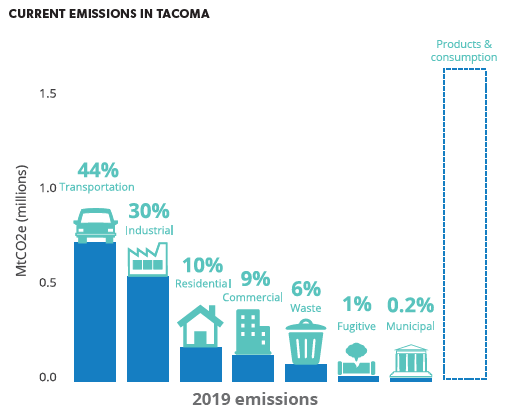Human activities are rapidly increasing the concentration of greenhouse gases in the atmosphere, trapping extra heat and causing our climate to change. These changes are felt globally, nationally, and here at home, threatening Tacoma’s unique and treasured natural systems, our built environment, and the health and safety of our communities.
What does Climate Change mean for Tacoma?
Tacoma’s vulnerabilities to climate change impacts include:
- Increasing summer temperatures, especially in our urban areas
- Susceptibility to wildfire smoke and the effect on human health
- Rising sea levels that cause high-tide flooding, coastal erosion, and affect important species in our tidal flats
- Declining snowpack which impacts freshwater availability, winter recreation, and important species like salmon that spawn in our rivers
- Changing stream flow and stream temperature as snow melts faster in the spring and rain patterns change
- Heavier rainstorms, and more.
The City of Tacoma has set aggressive carbon pollution reduction targets and is tracking progress on priority environmental actions. Explore the topics below to learn more about what we are doing at the City to address climate change.
.png) Tacoma's 2030 Climate Action Plan: Available Now
Tacoma's 2030 Climate Action Plan: Available Now
In response to Resolution No. 40509 declaring a climate emergency in Tacoma and Resolution No. 40622 affirming Tacoma’s commitment to anti-racism and system transformation, the City of Tacoma is taking on a new process of updating the Environmental Action Plan through a new climate action planning process that centers equity, anti-racism, and transformation.
The Tacoma Climate Action Plan will take action for healthy, affordable housing; clean, reliable transportation; and green, good-paying jobs.
Strengthen the City’s Commitment to Decarbonization
City Council Resolution No. 40776, effective January 2022, commits City to reduce municipal operations emissions especially restricting natural gas use in existing municipal buildings and new capital investments, decarbonize transportation, and conduct studies that identify strategies for success and assess impact. Reports from two studies completed in 2023 provide both municipal and community-wide guidance. Human activities are rapidly increasing the concentration of greenhouse gases in the atmosphere, trapping extra heat and causing our climate to change. These changes are felt globally, nationally, and here at home, threatening Tacoma’s unique and treasured natural systems, our built environment, and the health and safety of our communities.
In December 2019, City Council approved Resolution No. 40509, declaring a climate emergency in Tacoma, and affirming Council’s support of initiatives that mitigate impacts.
A strategy developed in 2021 to understand Tacoma’s climate vulnerabilities, and to help the City continue to invest in a climate-resilient and climate-smart future by building on our long history of climate action.
An inventory of our City and community greenhouse gas emissions is conducted every few years to monitor the sources of our emissions and to better understand the effectiveness of the actions we are taking to reduce emissions.
